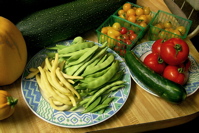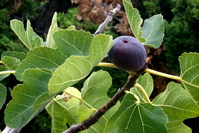Unsung Heroes and Open Source Seeds
A recent scholarly paper illustrates strong parallels between open source software and access to heirloom seeds. Out on the agricultural frontier, links between farmers and geeks are being forged, as farmers tap into the global Internet and discover the need to apply Open Source principles to seeds.
The fight against patented seed varieties goes back many years. The late Professor Elwyn Meader of the University of New Hampshire was a noted opponent to plant patenting, arguing that if even one dollar of taxpayer money went into developing a plant variety, it must be made available to the public. A wonderful biography and tribute to Prof Meader was recently published by Fedco Seeds, and that is where I learned of the existence of this unsung hero. The photo you see here is from a USDA report on strawberry development, and links to the brief biography of Prof Meader included in the report.
Meader's efforts in plant breeding and propagation spanned the 1930's into modern times, and searching heirloom seed catalogs one finds him credited with dozens of varieties. If you garden with heirloom varietals, especially in cooler climates, odds are that you are growing something he developed. Golden Midget watermelon? Elwyn Meader. Royalty Purple Pod bean? Elwyn Meader. Sweet Chocolate bell pepper, and Applegreen eggplant? Elwyn Meader. Mid-season Bush Cherries? You guessed it. Meader Highbush Blueberry? Meader Persimmon (self-pollinating)? The list goes on and on. Meader's work is particuarly appreciated in the lower USDA zones, and in climates like the UK, where standard varieties often fail to set fruit or produce well, due to lower temperatures.
Now fast-forward back to seeds and open source. An article on so-called SuperOrganics illustrates the new route to improving plants without burdening them with patents or creating potentially harmful transgenic varieties. Merely map the genome of the plant, and use that knowledge to pick and choose among traits in several varieties of the plant. Once you know what you're breeding for, and can screen the offspring, the process of developing a variety with the desired traits can be shortened for patient years to impatient months. And, in the process, the genome has the potential to become protected by GPL-style licensing.
One pioneer in this process, Richard Jefferson, developed a useful marker gene as a grad student and protected it with licensing. Researchers and farmers can use it freely, yet the big agribiz companies like Monsanto have to pay to license it-- and with those revenues, Jefferson set up CAMBIA, "an international, independent non-profit research institute pioneering Open Source Biology and Informatics to support Patent Transparency." Does that rock, or what?








0 Comments:
Post a Comment
<< Home